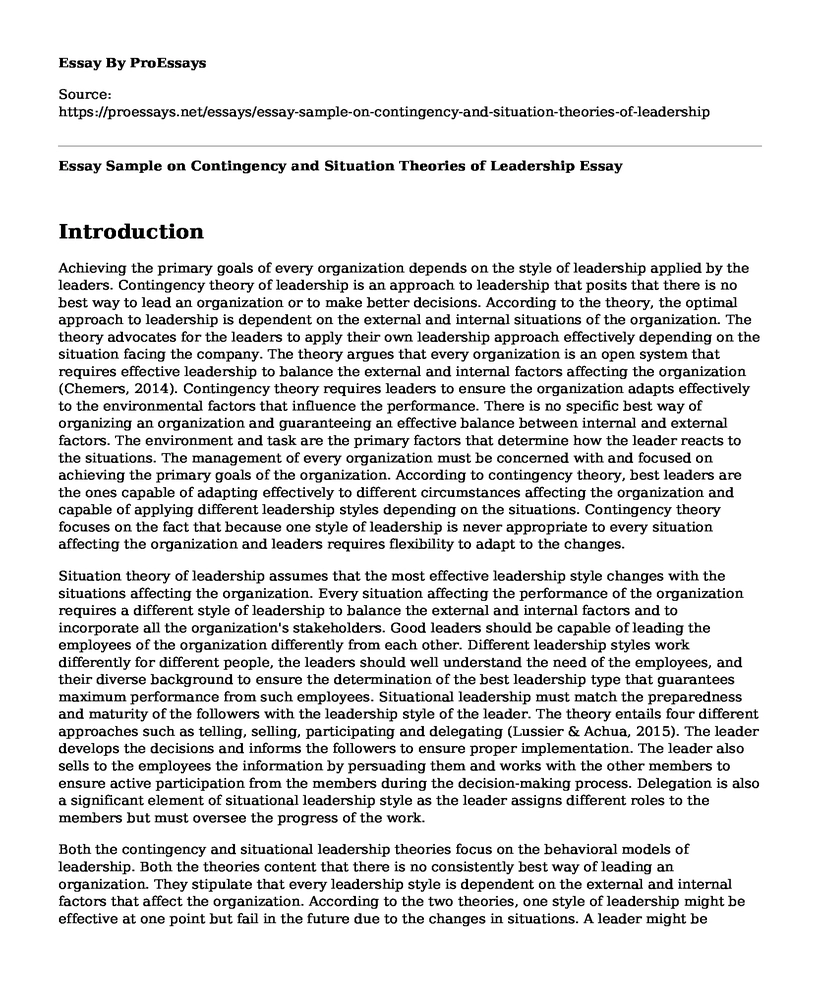Introduction
Achieving the primary goals of every organization depends on the style of leadership applied by the leaders. Contingency theory of leadership is an approach to leadership that posits that there is no best way to lead an organization or to make better decisions. According to the theory, the optimal approach to leadership is dependent on the external and internal situations of the organization. The theory advocates for the leaders to apply their own leadership approach effectively depending on the situation facing the company. The theory argues that every organization is an open system that requires effective leadership to balance the external and internal factors affecting the organization (Chemers, 2014). Contingency theory requires leaders to ensure the organization adapts effectively to the environmental factors that influence the performance. There is no specific best way of organizing an organization and guaranteeing an effective balance between internal and external factors. The environment and task are the primary factors that determine how the leader reacts to the situations. The management of every organization must be concerned with and focused on achieving the primary goals of the organization. According to contingency theory, best leaders are the ones capable of adapting effectively to different circumstances affecting the organization and capable of applying different leadership styles depending on the situations. Contingency theory focuses on the fact that because one style of leadership is never appropriate to every situation affecting the organization and leaders requires flexibility to adapt to the changes.
Situation theory of leadership assumes that the most effective leadership style changes with the situations affecting the organization. Every situation affecting the performance of the organization requires a different style of leadership to balance the external and internal factors and to incorporate all the organization's stakeholders. Good leaders should be capable of leading the employees of the organization differently from each other. Different leadership styles work differently for different people, the leaders should well understand the need of the employees, and their diverse background to ensure the determination of the best leadership type that guarantees maximum performance from such employees. Situational leadership must match the preparedness and maturity of the followers with the leadership style of the leader. The theory entails four different approaches such as telling, selling, participating and delegating (Lussier & Achua, 2015). The leader develops the decisions and informs the followers to ensure proper implementation. The leader also sells to the employees the information by persuading them and works with the other members to ensure active participation from the members during the decision-making process. Delegation is also a significant element of situational leadership style as the leader assigns different roles to the members but must oversee the progress of the work.
Both the contingency and situational leadership theories focus on the behavioral models of leadership. Both the theories content that there is no consistently best way of leading an organization. They stipulate that every leadership style is dependent on the external and internal factors that affect the organization. According to the two theories, one style of leadership might be effective at one point but fail in the future due to the changes in situations. A leader might be successful in one situation but fails in the next while still in the same position due to the frequent changes in factors that affect the organization. External and internal factors affecting the performance of the organization are the primary factors that determine the type of leadership applied by every leader at a given moment in the organization.
Situation leadership theories focus on the various factors that a leader must adopt given the behavior of the followers while contingency theory focuses on the broader factors such as skills of the leader, leader's capability and variables affecting the given situation (Chemers, 2014). Contingency leadership style is more rigid as compared to the situational style of leadership. Situational style is very effective in the workplace since it allows the leader to be more flexible to the situations affecting the performance of the organization by applying styles based on all the prevalent factors. Situational leadership style, unlike contingency, allows maximum participation from followers since it incorporates them in the decision-making process depending on the different situations affecting the organization. The best way to lead an organization is to ensure maximum motivation and satisfaction of all the stakeholders of the organization. It escalates the level of performance of the stakeholders and enables the organization to achieve its primary goals. Situational leadership style, therefore, makes the workplace a better working environment.
References
Chemers, M. (2014). An Integrative Theory of Leadership. London, England: Psychology Press.
Lussier, R. N., & Achua, C. F. (2015). Leadership: Theory, Application, & Skill Development. Boston, MA: Cengage Learning.
Cite this page
Essay Sample on Contingency and Situation Theories of Leadership. (2022, Nov 14). Retrieved from https://proessays.net/essays/essay-sample-on-contingency-and-situation-theories-of-leadership
If you are the original author of this essay and no longer wish to have it published on the ProEssays website, please click below to request its removal:
- Research Proposal on Globalization: Successful Strategy Management
- How Stakeholders Involvement is Important to a Successful Project Paper Example
- Institutional Entrepreneurship, Service Innovation and Operation Management of Service-Oriented Government in China
- The Bright Happy Learning Day Care Company Analysis Paper Example
- Integrity: Its Purpose, Importance & Effects - Essay Sample
- Leading Lakeland Clinic to Success: A Project to Build Leadership and Quality of Care
- Project Management: A Necessary Tool for Career & Life Goals - Essay Sample







